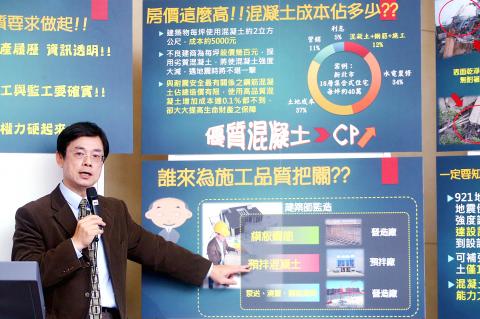Weak, watered-down concrete was likely used in the Weiguan Jinlong complex that collapsed in the Feb. 6 earthquake, academics and industrial representatives said yesterday, calling on the Ministry of Interior’s Construction and Planning Agency to randomly sample the concrete used in major construction projects to deter such practices.
The Taiwan Concrete Institute and Taiwan Ready-mixed Concrete Industry Association held a news conference at National Taiwan University (NTU) to call for regulatory reform.
Chan Yin-wen (詹穎雯), a professor of civil engineering at the university and the institute’s executive director, said that while some media reports on the complex’s collapse focused solely on possible problems with its steel beams, photographs taken at the site suggest that weak, watered-down concrete was also a factor in the building’s collapse.

Photo: CNA
The collapse of the 17-story complex in Tainan’s Yongkang District (永康) caused 115 deaths, as one more body was found yesterday, and was the largest source of casualties in the magnitude 6.4 earthquake.
“The exterior of the broken steel beams [found in the rubble] are smooth and have very little concrete attached to their surface. This shows that the concrete used in the building’s construction was not strong enough to effectively reinforce the steel beams when the earthquake struck, causing them to snap,” Chan said, adding that another factor that might have contributed to the collapse could be the use of too little concrete.
While an official examination of the building is ongoing, an academic survey of more than 1,000 buildings damaged in the 921 Earthquake in 1999 found that the quality of concrete was directly related to damage, Chan said, adding that concrete in 88 percent of the damaged buildings surveyed in 1999 failed to meet regulatory standards.
Price competition, combined with poor accountability, encourages developers to take shortcuts, such as watering down concrete to cut costs and make pouring easier, he said.
“The responsibility of architects to supervise construction has not been realized because it is unclear and no authority enforces the standards. After a developer constructs and sells a building, they can be cleared of any responsibility if they change their company’s name and keep on building through other means,” he said.
“The problem is that while they might be saving several hundred New Taiwan dollars per ping [3.3 m2], they are endangering a consumer value of up to NT$50,000 per ping [for houses in Taipei and New Taipei City],” he said.
The institute and the association recommended the Construction and Planning Agency conduct random sampling of the concrete used in major construction projects and publicize any sub-standard results along with other projects that had been developed by the company.
Companies caught cheating would find it difficult to sell properties in completed buildings, making them think twice before taking shortcuts, Chan said, adding that use of sub-standard materials in public construction projects dropped sharply after random sampling was introduced.
The institute and association also recommended that “production resumes” for concrete used for buildings be compiled and publicized, as well as amendments made to the Building Act (建築法) to clarify responsibility for supervision and quality control of construction projects.

‘DENIAL DEFENSE’: The US would increase its military presence with uncrewed ships, and submarines, while boosting defense in the Indo-Pacific, a Pete Hegseth memo said The US is reorienting its military strategy to focus primarily on deterring a potential Chinese invasion of Taiwan, a memo signed by US Secretary of Defense Pete Hegseth showed. The memo also called on Taiwan to increase its defense spending. The document, known as the “Interim National Defense Strategic Guidance,” was distributed this month and detailed the national defense plans of US President Donald Trump’s administration, an article in the Washington Post said on Saturday. It outlines how the US can prepare for a potential war with China and defend itself from threats in the “near abroad,” including Greenland and the Panama

The High Prosecutors’ Office yesterday withdrew an appeal against the acquittal of a former bank manager 22 years after his death, marking Taiwan’s first instance of prosecutors rendering posthumous justice to a wrongfully convicted defendant. Chu Ching-en (諸慶恩) — formerly a manager at the Taipei branch of BNP Paribas — was in 1999 accused by Weng Mao-chung (翁茂鍾), then-president of Chia Her Industrial Co, of forging a request for a fixed deposit of US$10 million by I-Hwa Industrial Co, a subsidiary of Chia Her, which was used as collateral. Chu was ruled not guilty in the first trial, but was found guilty

A wild live dugong was found in Taiwan for the first time in 88 years, after it was accidentally caught by a fisher’s net on Tuesday in Yilan County’s Fenniaolin (粉鳥林). This is the first sighting of the species in Taiwan since 1937, having already been considered “extinct” in the country and considered as “vulnerable” by the International Union for Conservation of Nature. A fisher surnamed Chen (陳) went to Fenniaolin to collect the fish in his netting, but instead caught a 3m long, 500kg dugong. The fisher released the animal back into the wild, not realizing it was an endangered species at

DEADLOCK: As the commission is unable to forum a quorum to review license renewal applications, the channel operators are not at fault and can air past their license date The National Communications Commission (NCC) yesterday said that the Public Television Service (PTS) and 36 other television and radio broadcasters could continue airing, despite the commission’s inability to meet a quorum to review their license renewal applications. The licenses of PTS and the other channels are set to expire between this month and June. The National Communications Commission Organization Act (國家通訊傳播委員會組織法) stipulates that the commission must meet the mandated quorum of four to hold a valid meeting. The seven-member commission currently has only three commissioners. “We have informed the channel operators of the progress we have made in reviewing their license renewal applications, and